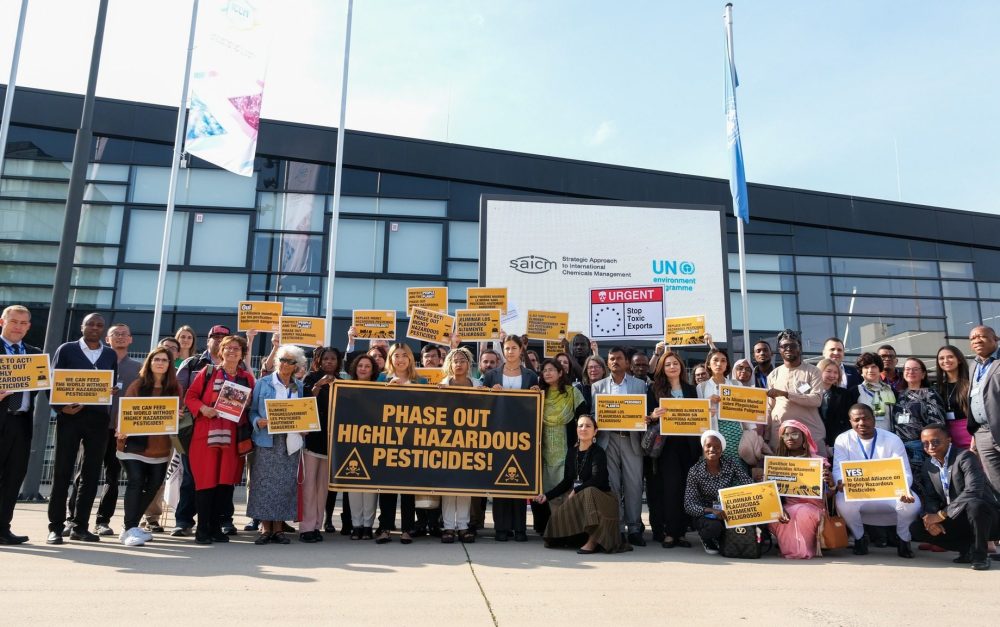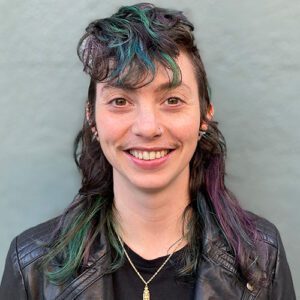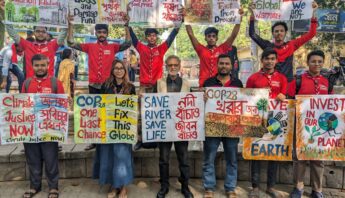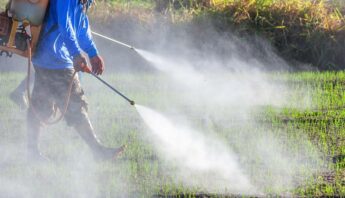Highly Hazardous Pesticides (HHPs) are a subset of toxic pesticides that cause significant harm to people, biodiversity, and the environment. This fall, an important resolution on HHPs was adopted by governments and UN institutions at the world chemicals conference. The resolution, which is part of a new global policy framework, establishes the Global Alliance on Highly Hazardous Pesticides, a multi-stakeholder body mandated to develop and implement tangible action to phase out HHPs worldwide.
This significant achievement would not have passed without the advocacy of civil society and Indigenous Peoples organizations, especially in the Global South.
Pesticide poisoning is a global human rights and public health concern
While all pesticides are toxic and designed to have adverse impacts on their targets, HHPs have particularly high levels of acute or chronic hazards to human health and the environment. They are considered too dangerous for use by international hazard classifications. Every year, almost half of the world’s farmers and agricultural workers suffer from acute pesticide poisoning. Because they are so toxic, HHPs are responsible for a large number of these acute poisoning incidents. The majority of these cases are in Global South countries.
There are thousands of pesticides suicides annually, related to the larger systemic issue of the pesticide treadmill in which pesticides lose their effectiveness leading to increasing use of often more hazardous pesticides, that locks farmers into debt, land loss, and corporate capture. Toxic pesticides are a major contributor to the massive biodiversity loss, soil degradation, and the climate crisis as fossil fuel-based petrochemicals that contribute to greenhouse gas emissions.
Regulation of HHPs is uneven, contributing to global health and food system inequities. Only 4% of all pesticides on the market are covered in binding international conventions. Some countries in the European Union have banned certain HHPs while continuing to produce and export them to countries in Africa, Asia and Latin America. This is known as the “double standard” in pesticides trade.
Successful outcomes will catalyze global action on pesticides
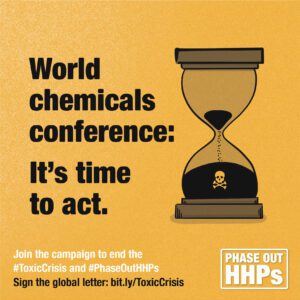
#PhaseOutHHPs social media image.
Every few years, the Strategic Approach on International Chemicals Management (SAICM) convenes the International Conference on Chemicals Management to set new directions for national and global policies on chemicals and waste. The Fifth ICCM (ICCM5) took place in Bonn, Germany this past September. At its conclusion, the Global Framework on Chemicals – For a Planet Free of Harm from Chemicals and Waste was officially adopted which included a resolution on the establishment of the Global Alliance on HHPs.
PAN International participated in ICCM5 and the preceding Intersessional Process (IP4.3) in Bonn, representing all five regional centers from Africa, Asia Pacific, Latin America, Europe, and North America. In total, the PAN delegation’s participation came from Kenya, Senegal, Malaysia, the Philippines, Uruguay, the UK, Germany, and the US (represented by yours truly).
PAN went into the negotiations with strong proposals for concrete action by 2030 to phase out the most dangerous pesticides (HHPs), prohibit the export of substances that are prohibited nationally (to end the double standard), to implement policies and programs for safe, sustainable, non-chemical alternatives like agroecology, and to establish a Global Alliance to oversee these steps. These proposals were delivered in a briefing to SAICM delegates at the national, regional and secretariat level before the IP4.3 and ICCM5 meetings began.
The initial proposal for a Global Alliance was put forth by the entire Africa Regional Group of SAICM, which represents all 54 African countries. It was introduced in February 2023 during the IP4.2, and successfully put on the table for negotiation with support from many countries in other UN Regions, as well as stakeholders.
Ultimately, the SAICM Global Framework did not include the ambitious language supported by PAN. However, several critical targets were adopted that PAN actively negotiated on:
- “By 2035, stakeholders have taken effective measures to phase out highly hazardous pesticides in agriculture where the risks have not been managed and where safer and affordable alternatives are available; and to promote transition to and make available those alternatives.” (Target A7)
- “By 2030, Governments work towards notifying or regulating or prohibiting the export of chemicals they have prohibited nationally, in line with their international obligations.” (Target A5)
- “By 2030, Governments implement policies and programmes to increase support to safer and more sustainable agricultural practices, including agroecology, integrated pest management and the use of non-chemical alternatives, as appropriate.” (Target D5)
Importantly, the approved resolution on the Global Alliance (see V/11 p.19) mandates that its function is to promote a global phase out of HHPs and the adoption of safer and more sustainable alternatives. The UN Food and Agriculture Organization (FAO) will be the leading agency, with participation from the World Health Organization (WHO), the International Labor Organization (ILO) and UN Environment Programme (UNEP); as well as civil society and private sector stakeholders. The coordination between these UN agencies builds significant momentum for fulfillment of their obligations to uphold human and workers’ rights, support healthy food systems, enforce environmental protection, and improve public health and labor conditions—all of which are affected by toxic pesticides.
These outcomes show progress has been made to address the health injustices faced by hundreds of millions of farmers and workers exposed to pesticides worldwide. As stated in PAN’s press statement following ICCM5:
“While imperfect, commitments made under the new framework are nonetheless significant and should catalyze action for global reforms on pesticide policy. Only when we choose to prioritize the protection and well-being of people and the planet over the interests of profit can we hope to achieve our vision of a planet free of harm from pesticides.”
Nearly 400 civil society organizations from 74 countries petition to get HHPs out of agriculture!
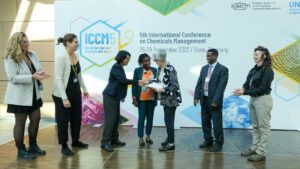
A group of activists present the ICCM5 Conference President with the petition.
Leading to the ICCM5, PANNA and PANAP organized a petition letter to governments and other stakeholders of SAICM calling for bold and urgent commitments in the new SAICM framework to phase out HHPs and end double standards in pesticides trade. 373 civil society organizations from 74 countries signed on.
At the start of the ICCM5, PAN hand-delivered the letter to the Conference President Dr. Anita Breyer. Simultaneously, PAN called for a global week of action to Stop the #ToxicCrisis and #PhaseOutHHPs, mobilizing people and organizations worldwide to uplift messages such as, “World chemicals conference: It’s time to act.” and “We can feed the world without Highly Hazardous Pesticides.”
The petition addressed the demands from farmers, farmworkers, Indigenous Peoples and other rural peoples; trade unions; environmental and health professionals; scientists and academia; pesticide poisoning victims; and consumer and rights advocates all over the world:
“If the Sustainable Development Goals are to be achieved, ecological collapse is to be averted, and human rights are to be upheld — including the right to food and the right of future generations to a clean and healthy environment — everyone must work together towards eliminating the world’s most dangerous pesticides, and phasing-in and scaling-up safer agroecological alternatives.”
Demonstrating grassroots demands at the conference HQ
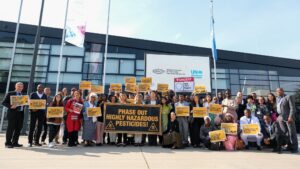
A large group of activists demonstrate at the entrance of the World Conference center in support of phasing out highly hazardous pesticides.
Several days into the conference PAN, along with German environmental groups ForumUE and Bund, organized a demonstration at the entrance of the World Conference center. Joined by IPEN, IITC, many NGOs from around the world, and the youth delegation, we rallied with our messages to phase out HHPs and establish a Global Alliance.
Our demonstration caught the attention of several journalists and media, resulting in local coverage and acknowledgement in the official ICCM daily updates read by delegates. We also supported each other’s intersectional demands for the negotiations, including that polluters must pay for results of chemical pollution, and to stop toxic exports.
Where we go from here
PAN International is closely following the next steps for the launch of the Global Alliance on HHPs. We will ensure the false narrative from the agrochemical industry that phasing out HHPs is detrimental to food security does not take hold, and uplift that HHPs have been phased-out in agriculture in a number of countries without affecting agricultural productivity (as acknowledged by FAO and WHO).
While it isn’t the boldest framework that PAN was pushing for, the commitments made under the new SAICM agreement are nonetheless a major win for catalyzing action at the global level toward the ultimate goal of phasing out HHPs. It’s imperative that the most dangerous pesticides be phased out and agroecology transitioned in, for the future of a healthy planet, people, and food systems.



